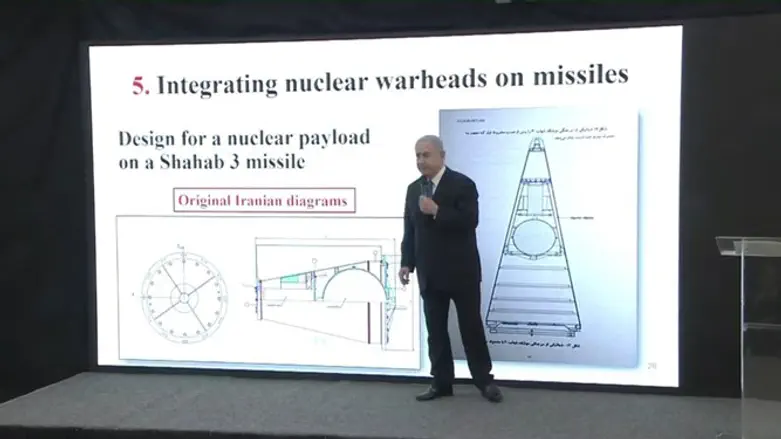
Yochanan Visser is an independent journalist/analyst who worked for many years as Middle East correspondent for Western Journalism.com in Arizona and was a frequent publicist for the main Dutch paper De Volkskrant. He authoreda book in the Dutch language about the cognitive war against Israel and now lives in Gush Etzion. He writes a twice weekly analysis of current issues for Arutz Sheva
On Wednesday, Frederica Mogherini, the European Union’s Foreign Policy Chief, reacted with an official statement to Prime Minister Binyamin Netanyahu’s stunning presentation on Iran’s nuclear weapons program last Monday.
While stressing that her reaction was “preliminary” since she had not been able to see “the details” of Netanyahu’s statement or to obtain an “assessment of the International Atomic Energy Agency” (IAEA), Mogherini claimed that based on 10 IAEA reports since the beginning of 2016 Iran had “fully complied with its commitments” under 2015-Joint Comprehensive Plan Of Action (JCPOA).
“The JCPOA, the nuclear agreement, is not based on assumptions of good faith or trust - it is based on concrete commitments, verification mechanisms and a very strict monitoring of facts, done by the IAEA,” according to Mogherini.
“The IAEA has published 10 reports, certifying that Iran has fully complied with its commitments,” she added while criticizing Netanyahu for not using “the proper, legitimate, recognized mechanisms, the IAEA and the Joint Commission (of the JCPOA)” to express his concerns.
There are a few problems with Mogherini’s statement, which reflects the opinion of a large majority of European leaders.
First of all, the IAEA has not been granted access to military sites where Iran is suspected of having conducted work related to its nuclear weapons program so no “very strict monitoring of the facts” takes place, as Mogherini claims.
One of these sites is Parchin where the Islamic Republic has conducted tests with detonators for nuclear warheads.
Iran refused to grant IAEA inspectors entrance to Parchin and after years of sanitizing the site of the tests with the detonators, Iranian engineers were allowed to take environmental samples which were then examined by the IAEA in Vienna.
According to the Institute for Science and International Security, the “IAEA detected the presence of anthropogenically processed (‘man-made’) particles of natural uranium,” in the samples.
The IAEA later admitted it didn’t even dare to ask the Iranians for inspections of military sites because the agency knew the Iranian refusal would mean it had to determine Iran was not fully complying with the JCPOA.
Secondly, the very existence of a secret archive full of files and disks documenting Iran’s attempts to produce nuclear weapons after the implementation of the JCPOA is proof Iran violated the deal.
Paragraph T of Annex 1 of the JCPOA explicitly prohibits Iran from “designing, developing, acquiring, or using computer models to simulate nuclear explosive devices.” (82.1).
The fact that the regime in Tehran decided to hide all files related to the development of nuclear explosive devices indicates that Iran breached the JCPOA, according to Israeli commentators.
Then there is the fact that Iran is suspected of having conducted work on its nuclear weapons program outside the borders of the Islamic Republic.
Israeli researchers last year published a study detailing Iran’s nuclear-related activities in North Korea while Der Spiegel in Germany, as well as the Washington-based Institute for Science and International Security (the good ISIS), published investigative articles suggesting Iran has built an underground nuclear site in Qusayr in Syria.
The underground site in Qusayr in the Qalamoun Mountains near the Lebanese border was called “the atomic factory” by a Hezbollah commander during a conversation with Ibrahim Othman, the head of the Syrian Atomic Energy Commission.
There’s more.
German intelligence (sic) and media revealed last year that Iran continued its “efforts to obtain material from German firms for its nuclear program and the construction of missiles,” after the implementation of the nuclear deal with six world powers.
An intelligence report issued by the State of Hamburg in 2017 stated: “there is no evidence of a complete about-face in Iran’s atomic policies in 2016.”
The same report revealed Iran had acquired “51 special valves” which were to be used “for the Islamic Republic’s sanctioned Arak heavy water reactor,” an installation that can be used to produce plutonium for nuclear weapons.
Finally, the Iranians themselves repeatedly admitted they cheated on the JCPOA.
Here’s for example, what Ali Akbar Salehi, the head of Iran’s Atomic Agency, said during an interview with IRINN TV in Iran on August 22, 2017.
Salehi told IRINN the Islamic Republic can return to its pre-deal enrichment level in only five days, a clear indication Iran breached the JCPOA and stockpiled prohibited nuclear components.
Salehi said that Iran had been able to preserve the underground Fordow facility where it has developed the new IR8 centrifuge which will enable a quick return to its pre-agreement uranium enrichment capacity (20 % enriched uranium).
During the same interview Salehi revealed another Iranian breach of the JCPOA when he said Iran had not poured cement in the core of the plutonium reactor in Arak as was mandated by the nuclear agreement.
“We (actually) poured cement only into some of the reactor’s pipelines, (pipes) several centimeters in diameter and two to three meters long. (We poured it) not into the reactor itself but (only) into the external pipes,” Salehi said.
He added that the plutonium reactor in Arak could be operable in a few months because of this Iranian deceptive trick.
Salehi’s revelation caused ISIS to declare that despite the JCPOA, “no pathway to the bomb is permanently closed.”
Amos Yadlin, the former head of IDF intelligence, told this reporter on Tuesday he’s seen enough intelligence on Iran to confirm that the Islamic Republic deceived the international community at least until 2011.
And then Yadlin added that an Israeli minister had told him the ‘Mossad files’ contain evidence Iran also cheated on the JCPOA after its implementation.